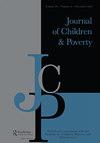Exploring the experiences and dynamics of an unconditional cash transfer for low-income mothers: A mixed-methods study
Q2 Social Sciences
引用次数: 13
Abstract
ABSTRACT Little is understood about how an unconditional cash transfer might operate and affect behavior among low-income parents of infants in the United States. We investigate these questions using data from a random-assignment pilot study (N = 30) in which unconditional cash transfers were distributed monthly on debit cards to two groups of low-income parents in New York City during the first 12 months of their newborns’ lives. Mothers were randomized to receive either $100 per month or $20 per month. Mothers distinguished spending the cash transfer on essentials vs. extras, such as going out to dinner with family. The monthly cash transfer “tided them over,” even at the lower amount of $20, especially when income from other sources ran short at the end of the month. Some mothers reported saving money for unexpected expenses.探索低收入母亲无条件现金转移的经验和动态:一项混合方法研究
摘要:在美国,人们对无条件现金转移如何运作和影响低收入婴儿父母的行为知之甚少。我们使用来自随机分配试点研究(N = 30),在新生儿出生的前12个月,每月通过借记卡向纽约市的两组低收入父母发放无条件现金转账。母亲们被随机分为每月100美元或每月20美元。母亲们将现金转账花在必需品上与额外支出(如与家人外出就餐)区分开来。每月的现金转账“让他们渡过了难关”,即使是20美元的较低金额,尤其是当月底其他来源的收入短缺时。一些母亲报告说,她们把钱存起来以备不时之需。
本文章由计算机程序翻译,如有差异,请以英文原文为准。
求助全文
约1分钟内获得全文
求助全文

 求助内容:
求助内容: 应助结果提醒方式:
应助结果提醒方式:


